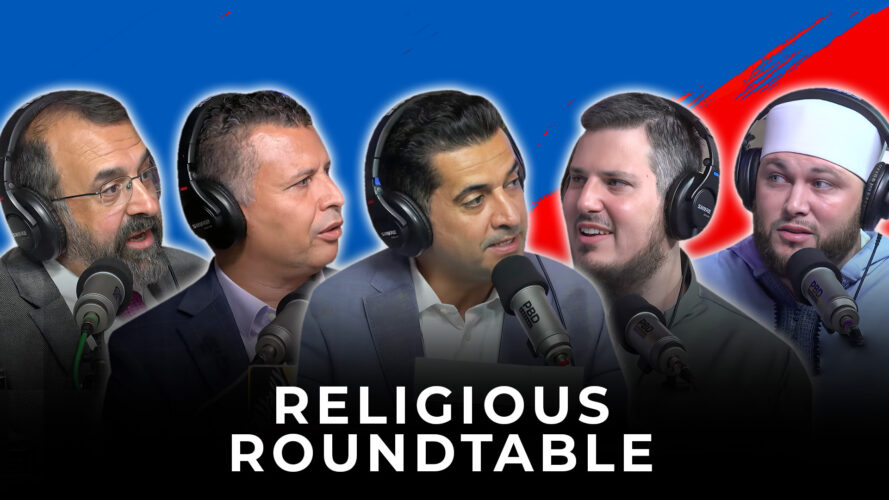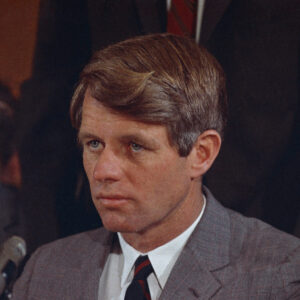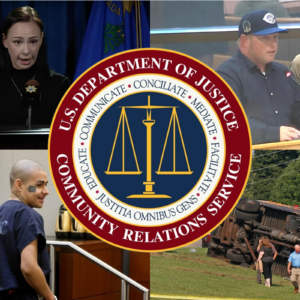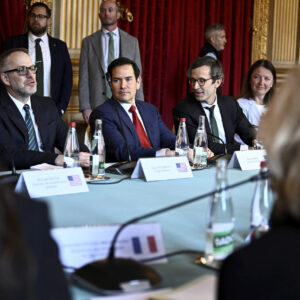On Thursday’s episode of the PBD Podcast, Patrick Bet-David was joined by a special expert panel for a roundtable discussion on the differences between Islam and Christianity.
Representing the Christian perspective were Robert Spencer, a noted anti-Islamic author and founder of JihadWatch.org, and Brother Rachid, a Moroccan-born Christian apologist who left the Muslim faith and fled to the United States in 2005. The Islamic perspective was defended by Daniel Haqiqatjou, a prominent Muslim lecturer and host of “The Muslim Skeptic,” and Jake Brancatella, a former Roman Catholic turned “Muslim Metaphysician.”
In this heated episode, PBD and the panel of experts debated religion and orthodoxy, discussed the biggest threats to all traditional religions, and worked to establish common ground between the two faiths.
Here are some of the main takeaways from this episode:
1. The Challenges of Islam and Christianity
It’s no secret that Christians and Muslims have been in conflict for thousands of years, with a rivalry stretching from ancient history up to modern times. To begin the discussion, PBD asked each panelist to discuss their biggest disagreement with the opposing worldview, sparking a heated and deeply personal debate between the two sides.
For Spencer, who has researched Islamic extremism extensively, the biggest problem is what he called Islam’s “sanctification of violence.” Specifically, he called attention to the Quran’s instruction to execute apostates, or people who renounce the Muslim faith. But as Haqiqatjou pointed out, the Old Testament writings of both Christians and Jews contain instructions to do the same. True faith, as he sees it, would remain consistent with what is written; only “wokeism” demands constant changes to meet current standards.
“Should I be put to death?” asked Rachid, who notably converted from Islam to Christianity while living in a Muslim-majority country. Brancatella responded by saying that, under an authentic Islamic state, a capital sentence could and should be applied after due process. Abandoning the faith threatens the community, and according to faithful Muslims, that threat warrants a lethal response … but according to Brancatella, Christians should accept the same policy or else directly accuse God of inconsistency. As he stated, it is more faithful to enforce what is written in the Quran than to “run away” from what is written in the Bible.
Subscribe to PBD’s YouTube channel today for every episode LIVE or On Demand!
2. The Threat of Secular Liberalism
In Muslim nations, Christians often find themselves treated like second-class citizens or facing direct threats of violence…but is it any better for Muslims in the Western world?
While he does not consider average Christians a threat to the Muslim community, Haqiqatjou warned of the danger of the “secular liberal hegemony” in the West, which threatens both devout Muslims and traditional Christians. The Enlightenment philosophy that pushes an atheistic, human-centered worldview was weaponized against Muslims after 9/11, leading to the wars in Iraq and Afghanistan and the oppression of Muslims in the United States — and on this, all parties agreed.
Spencer, despite his consulting work with the United States government after 9/11, acknowledged that America was never going to successfully bring democracy to the Middle East, further pointing out that secular “woke” culture has also begun attaching the Christian Church. When the West was Christian, he said, it didn’t have nearly as many issues as it has today. Western Christianity has been taken over by liberal standards “like ‘Invasion of the Body-Snatchers,’” turning churches into a mockery of authentic faith.
Building on the precedent set by anti-Muslim efforts from the last two decades, left-wing groups have become “increasingly unhinged” in their attacks on all traditional religions. But if leftist standards are so far out of alignment with traditional religious beliefs, why do so many Muslims vote for Democrats? Why are so many prominent Democrats practicing Muslims?
3. Muslims in the West
Speaking from his own experiences, Patrick, an Iranian Christian whose family migrated to the United States in search of safety and better opportunities, addressed the trend of people leaving Muslim nations and relocating to the West. Is this because Western nations are inherently better, or are more subtle factors at play?
According to Haqiqatjou, this trend has more to do with economic factors, evidenced by Christians from Asia and Africa frequently moving to the wealthier nations in the Middle East. Beyond that, Muslim nations are more conducive to raising a family with traditional values. Brancatella, who was born in the United States, even expressed a desire to move to Morocco to raise his children in a different environment. This family-centric mentality also explains why Muslims are reproducing at a disproportionately higher rate, leading to projections of a Muslim demographic takeover in the coming years.
But as Rachid argued, Muslims in the West are given a far greater quality of life than Christians under Muslim governments. The West only established the concept of human rights because of Christian influence, and according to Spencer, the only way to defend this legacy is for Christians to return to the roots of their faith and begin evangelizing and having children again.
And even Haqiqatjou admitted that a world with more Christians is better than a world with more atheists.
(RELATED: Are Muslims the Angriest People in the World?)
4. Why do Muslims Vote Democrat?
According to statistics provided by PBD, three-quarters of Muslims voted for Hillary Clinton in 2016, and 74% continue voting for Democrats even now. Given the Democratic Party’s support for LGBTQ+ causes, abortion, and sexual education for children, why do Muslims continue supporting them?
Haqiqatjou argued that it has more to do with the Republican Party’s actions after 9/11 when Muslims were targeted in the name of national security. Traumatized Muslim communities turned to the Democrats for support—but Democrats’ pro-Muslim sentiments are only skin-deep. While Joe Biden might claim to be a friend to Muslims, Haqiqatjou warns that he should not be trusted.
Agreeing with that assessment, Spencer further argued that Republicans tend to support Israel, which angers Muslim communities. Meanwhile, the Left focuses on fighting racism, extending that protection even to Islamic extremists.
But from there, the discussion quickly turned contentious. Accusations of racism, defamation, and terrorist sympathies flew as Spencer clashed with Haqiqatjou and Brancatella in a heated exchange.
5. More in Common Than What Divides Us?
To conclude the discussion, PBD asked the panelists to focus on the things that might unite Christians and Muslims against their common cultural enemies.
Shared values like the preservation of marriage, upholding morality, respecting parents, raising children, and prioritizing communities could potentially bring the two conflicting faiths together in the modern era…but would that be enough to erase thousands of years of religious differences?
But that’s not all Patrick Bet-David and his guests had to say during this special roundtable discussion. CLICK HERE to see what else Robert Spencer, Brother Rachid, Daniel Haqiqatjou, and Jake Brancatella had to say.


















Add comment